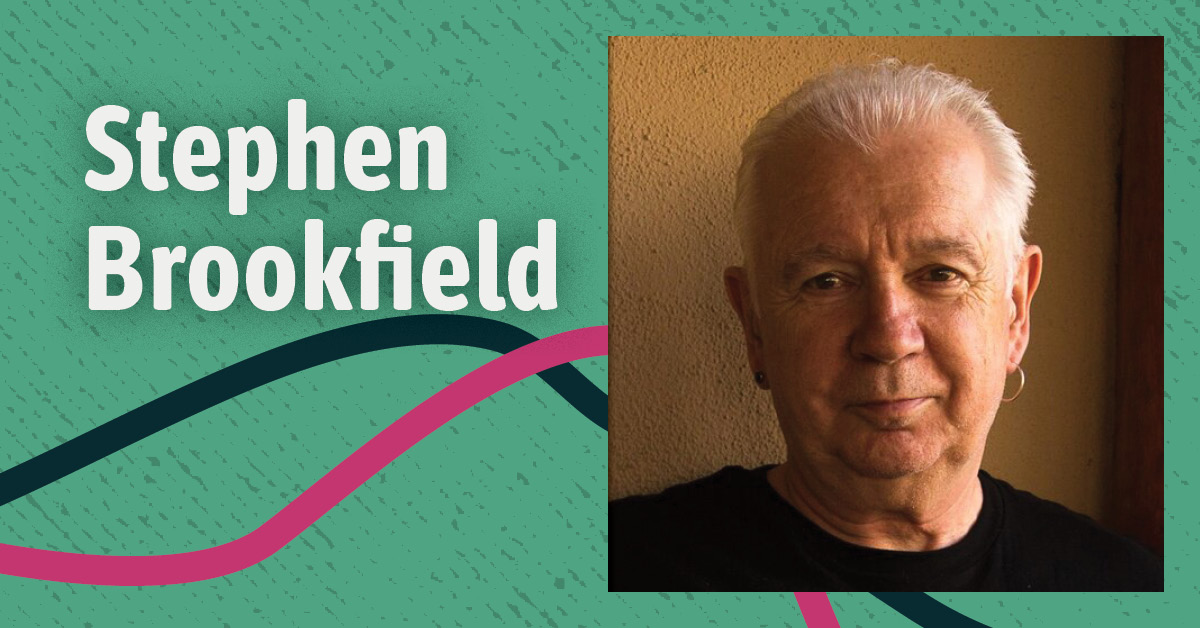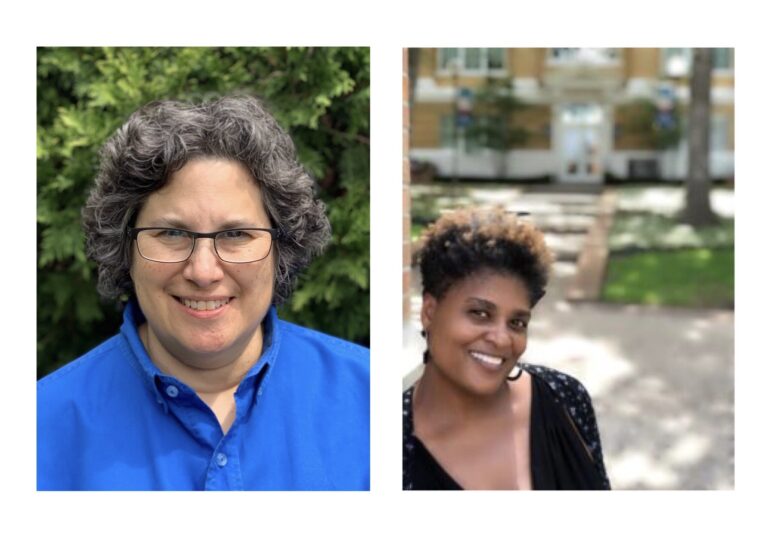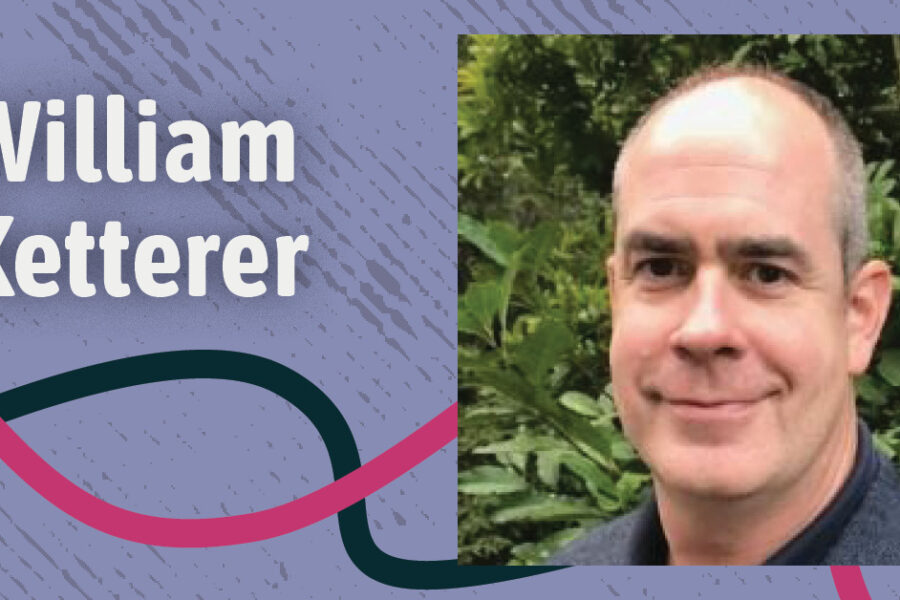“There’s only two ways you can do antiracist work—imperfectly or not at all,” says Stephen Brookfield, the scholar of critical pedagogy and antiracism who recently joined Antioch University as a Distinguished Scholar. As a white man working in antiracism (he co-wrote Becoming a White Antiracist, which will be published in 2021), Brookfield often encounters what he calls “a lot of very legitimate skepticism to deal with from colleagues and students of color.” But he continues on, imperfectly, because it’s personally meaningful to address “the problem of white folk not seeing how white supremacy—the idea that whites are innately more intelligent and therefore deserve quite naturally to be in positions of power and authority—is baked into our institutions and culture.”
This spirit of moving forward despite imperfections could be seen as a guiding principle in Brookfield’s life. Over a three-decade career he has helped define disciplines, received multiple international awards and honorary doctorates, and published dozens of books. In his career so far, you could even say that Brookfield has won a few “victories for humanity,” in the words of Antioch’s first president, Horace Mann. Now he has big intentions as he embarks on a new role as Antioch University’s first Distinguished Scholar.
“I’d like the institution to think they have someone on board who can be called on to work with any unit, department or program,” says Brookfield. He is excited to share his expertise around “treating students in an adult way, helping people learn how to think more critically, making teaching more responsive to student concerns, and helping white members of the institution with the task of confronting the white supremacy that lives inside and outside Antioch’s virtual walls.”
Chet Haskell, Vice Chancellor for Academic Affairs and University Provost, is equally enthusiastic about Brookfield’s appointment. “Part of why we were so excited to have Stephen join us is that his scholarly work and activism are completely in line with Antioch’s mission and values,” Haskell says. “Having him available as a trusted advisor across all of our education programs provides deep understanding and opportunity for our faculty members and, especially, our students, whom we seek to prepare for professional success within the context of pursuing racial and social justice.”
But though today Brookfield is taking on this distinguished new role, it was never a foregone conclusion that he would achieve such success at all in higher education—or even elementary school.
Formational Early Struggles
That Stephen Brookfield was hired as a “Distinguished Scholar” is somewhat ironic for someone who struggled to get passing grades in elementary school, in high school and even when he was an undergraduate in college.
“I was a very poor student,” he confesses over the phone from his home in St. Paul. “I couldn’t take examinations. I had anxiety issues, and when I took a closed-book exam, I froze up under the pressure of having only three hours.” Brookfield could prepare for tests as assiduously as any student in class, but it didn’t seem to matter. Judging by his grades, he was a terrible student.
It wasn’t until he entered a doctoral program at the University of Leicester in his native England that he began truly to flourish. He thrived in the format, which emphasized research and mastery over coursework and tests. “What I eventually realized was whatever abilities and knowledge I had were not being accurately reflected in the examination system.” While studying for his PhD, he says, “I flourished as a student, because I finally had control of the timing and method of my learning.”
Not only did he thrive, he made the insights generated by his earlier struggles the focus of his dissertation, which he titled “Independent Adult Learning.” This experience and the insights gleaned from it have proved so rich that Brookfield has made adult education the centerpiece of his career as a scholar and educator, which has taken him to the University of British Columbia, Teachers College at Columbia University, Harvard University, the University of St. Thomas in Minneapolis-St. Paul, and now to Antioch University.
“When I started thinking about teaching,” Brookfield says, “I wanted to work with adults that the system had labeled as mediocre—adults who wanted a credential, but who had left school without one.” He was fascinated by questions like, “How do you become recognized as a leader in your field when the schooling system says you’re a relative failure?” And he didn’t just want to understand it; he wanted to do something about it. In doing this work, Brookfield joined a larger movement of scholars, educators, and activists who helped transform adult education—in part by normalizing that idea that universities could give credit for the learning that adults already have done, even if it wasn’t completed in a traditional classroom setting.
A Natural Fit at Antioch
Antioch has long been a leader in adult education and degree completion, so Brookfield was a natural fit for the school. As a Distinguished Scholar, he will not be attached to any one campus but instead will be made available to all the campuses on an as-needed basis.
His initial project this year has been helping the university as it has developed its new Doctorate of Education program. According the program’s director, Michael Raffanti, “Stephen’s current focus on antiracism has been vital to the EdD, as he is helping to design the curriculum for our Multicultural and Antiracist Education specialization.”
Raffanti was initially thrilled but also a bit apprehensive about working with Brookfield. “Thrilled because I’d been reading admiring his work for years, yet apprehensive about working with such a well-known scholar,” he explains. “However, I have found Stephen to be quite humble and generous in sharing not only his theoretical expertise, but also his practical advice about developing a new doctoral program such as ours.”
Across Antioch, Brookfield’s extensive background in issues of adult education and social justice—issues that often overlap—will continue being of use. Says Raffanti, “we will continue to leverage Stephen’s expertise in adult learning theory as we further grow the EdD curriculum and launch our national School of Education.”
A Growing Awareness of Racism…and Antiracism
Throughout Brookfield’s work with non-traditional and adult students, he has found it important for those students to understand that they were often underestimated not because of their own mistakes or gaps in knowledge but because they didn’t fit ideological assumptions about what a “normal” education looked like. As he taught in the United States starting in 1982, he found his explorations of the obstacles students faced inevitably led to the issue of racism. The longer he taught in the United States, the more unavoidable this subject became.
“Before I came here,” he explains, “race wasn’t really on my horizon. But the more that I worked with people of color—both colleagues and students—the more my eyes were opened to the problems of race.” He came to realize that race was a key issue—and that he had been in some ways blind to it because the reality he lived in was so different than that of Black people and other people of color. Eventually he came to realize that the problems of race underpinned many other social problems. “I realized that if we don’t make progress on race, we’re really doomed.”
When Brookfield asked colleagues and students, “What’s the most effective thing a white person can do to get rid of racism?” the answers were surprisingly similar. “Become aware of what it means to be a white person in this world,” they told him. “It’s nice if you want to learn more about African American culture and history,” they’d say. “But what would be most helpful is to understand that white people are a race and that what many white people think of as the ‘normal’ way of doing things is actually the white way of doing things.”
Out of decades of research, self-interrogation, and engagement with colleagues and students, Brookfield came to understand that not only was race key to understanding America’s social problems, it also wasn’t enough just to be “not racist.” One had to become antiracist. This question became increasingly important to his scholarly work and activism.
Writing the Book on White Antiracism
Brookfield’s newest book, Becoming a White Antiracist: A Practical Guide for Educators, Leaders and Activists, which he co-authored with Mary Hess, will be released by Stylus Publishing in February 2021. The first four chapters can be found at www.stephenbrookfield.com. It collects knowledge and exercises developed through over twenty years of antiracism workshops that the two authors have led at colleges and workplaces in Minnesota and New York.
It’s not enough, Brookfield argues in the book, for white people merely to gain an identity as a white person. They must develop an identity as a white antiracist, someone who will not only shed personal prejudices but also seek to detect and reject institutional behavior that gives one race an advantage over another.
“When whites come into these situations—whether it’s ‘diversity training’ or ‘a conversation on race’—they often say, ‘I don’t see color; I’m color-blind’ or ‘We just had a Black president, we’re in a post-racial era,’” Brookfield says. “They don’t see themselves as having a racial identity because they believe their world is what’s normal, that it’s brown and Black people who have race.” Brookfield points to a fear and shame that many white people feel at the idea that they are gaining an advantage because of the social caste system. As he explains it, personal narratives of hardship can obscure wider social forces for white people who have not yet become antiracists. “‘How am I privileged?’ they might say. ‘I work three jobs and still can’t afford a car. I have to take public transportation. How is that privileged?’”
To overcome these reactions, Brookfield emphasizes that systemic racism is so thoroughly integrated into daily life that it becomes hard to recognize, especially if you are the unwitting beneficiary of it. “If people can understand that racist instincts, impulses, and actions are learned as part and parcel of moving through the systems and institutions in which they live their lives,” Brookfield and Hess write in the book, “then they will see it would be remarkable for them not to have learned racism.”
“I don’t want you to be embarrassed about being white,” he says over the phone. “I want you to be proud of being an antiracist white person. I want you to ask yourself, ‘How do I create a fair world for my children?’ That means more than just getting rid of personal prejudice. It means actively fighting for racial justice on an institutional and social scale.”
A Liverpudlian in Minnesota
Brookfield, now 71, was born and raised in a tough, working-class, inner-city neighborhood in Liverpool. It was a good place to learn about class issues from a proletarian perspective but not such a great place to learn about racial issues. Though the city is more multicultural today, during the 1960s, it still had an overwhelmingly Irish-Catholic population.
Once he had his hard-won PhD in hand, he traveled to New York in 1982 to teach at Columbia and enjoy a bit of international adventure before he returned to London. But he fell in love with Kim Miller, a language immersion teacher. They eventually married and remain together to this day.
At the same time he was falling in love with Kim, Brookfield fell in love with New York. “I always felt it was a separate country from America,” he says. He loves that it’s “this multi-racial, multicultural hot spot smushed into this tiny place.” He’s been in the U.S. ever since, and he became a citizen in 2002.
Brookfield and Miller, who grew up in Minnesota, moved to the Twin Cities in 1992. Brookfield eventually taught at St. Thomas University for 28 years, where he held the John Ireland Chair and was a Distinguished University Professor. This was a deeply productive era in his career, as he published nineteen books and gave talks around the world. Living in the Midwest also afforded Brookfield a different and closer look at rural, white America—an experience that spurred along his thinking around antiracism and led to him writing more recent books like Teaching Race: How to Help Students Unmask and Challenge Racism (2019).
Earlier this year, Brookfield became emeritus at St. Thomas. This served as an opportunity to start a new chapter in his scholarly life, and he began looking for work in an institution that took social justice seriously. He had known of Antioch for many years and had several colleagues who had studied in its programs. “I liked the way that working for social change was at the center of Antioch’s mission,” he explains. “And I liked what I’d heard about the adult learning and student-focused nature of Antioch’s methodology.” He applied for a full-time job in the PhD in Leadership and Change, but then he decided he didn’t want a full-time position after all. At that point GSLC Provost Laurien Alexandre asked if Brookfield would be interested in a university-wide role—the position he ended up taking.
For Brookfield, one of the best things about working at Antioch is its commitment to working with adult students, many of whom have jobs and families and live full lives beyond their studies. “For most of my career I’ve mostly worked within more traditional universities that essentially treated working adult students as if they were full-time, residential 18-to-22-year-olds,” he explains. “So it’s good to be at a place where I don’t have to keep saying, ‘Remember, these students are adults.’”
The Singer-Scholar
In addition to his academic career, Brookfield is a dedicated singer, songwriter, and guitarist. He’s been in bands since he was in high school, and in 2008 he formed a Twin Cities quartet called the 99ers. On its Bandcamp page, the group lists these three guiding principles: “Keep it short!! Bang it out!! No messing about!!” In practice, this results in a hooky, high-speed punk rock reminiscent of the rock band Green Day.
“My two musical passions are the Ramones and the Beach Boys,” Brookfield reveals. “When the Ramones hit, it was like my whole life was reborn. They brought rock ‘n’ roll back to what I thought it should be: short, punchy songs about nothing of any particular consequence, just three chords, and fun.”
“So I thought a band that added Beach Boys harmonies to the Ramones, with a little rockabilly thrown in, would be the best of all worlds,” he explains.
The 99ers have released six full-length albums since 2008, the latest being 2017’s Pop Punk Girl. Despite this productivity—and positive reviews—music remains a passionate hobby for Brookfield. “I wish I could do it full-time,” he says, “but it’s hard to make a living at it. It’s the complete opposite of my academic life, but nothing feels better than banging out a power chord.”
Much Yet to Accomplish
Brookfield’s goals for the future are in keeping with the drive that has made him so prolific to this point. “Creatively,” he says, “I’d like to write the best pop punk song ever recorded and have my band release it to an astonished world.”
This will go in tandem with his political intention to keep working within his spheres of influence “to make compassion, not profit, the value by which we judge whether or not we’re doing things right.”
And in his professional life at Antioch, too, he says he has much work that he’s excited to accomplish. “I’d like to help colleagues and students become more critically reflective, and to help myself and others understand what it means to become a white antiracist.”
As a pop punk front man, as an adult education and antiracist activist, and as a scholar-educator, Stephen Brookfield has come a long way from his roots as a boy in Liverpool who couldn’t for the life of him take a test. And he hasn’t come to the end just yet.

Geoffrey Himes
Geoffrey Himes ’72, ’75 (Antioch Maryland, BA, MA) is an award-winning writer who wrote about pop music on a weekly basis in The Washington Post from 1977 to 2019. Himes has also written for Rolling Stone, Oxford American, The New York Times, Smithsonian, National Public Radio, Downbeat, and other outlets. His book on Bruce Springsteen, Born in the U.S.A., was published by Continuum Books in 2005.




